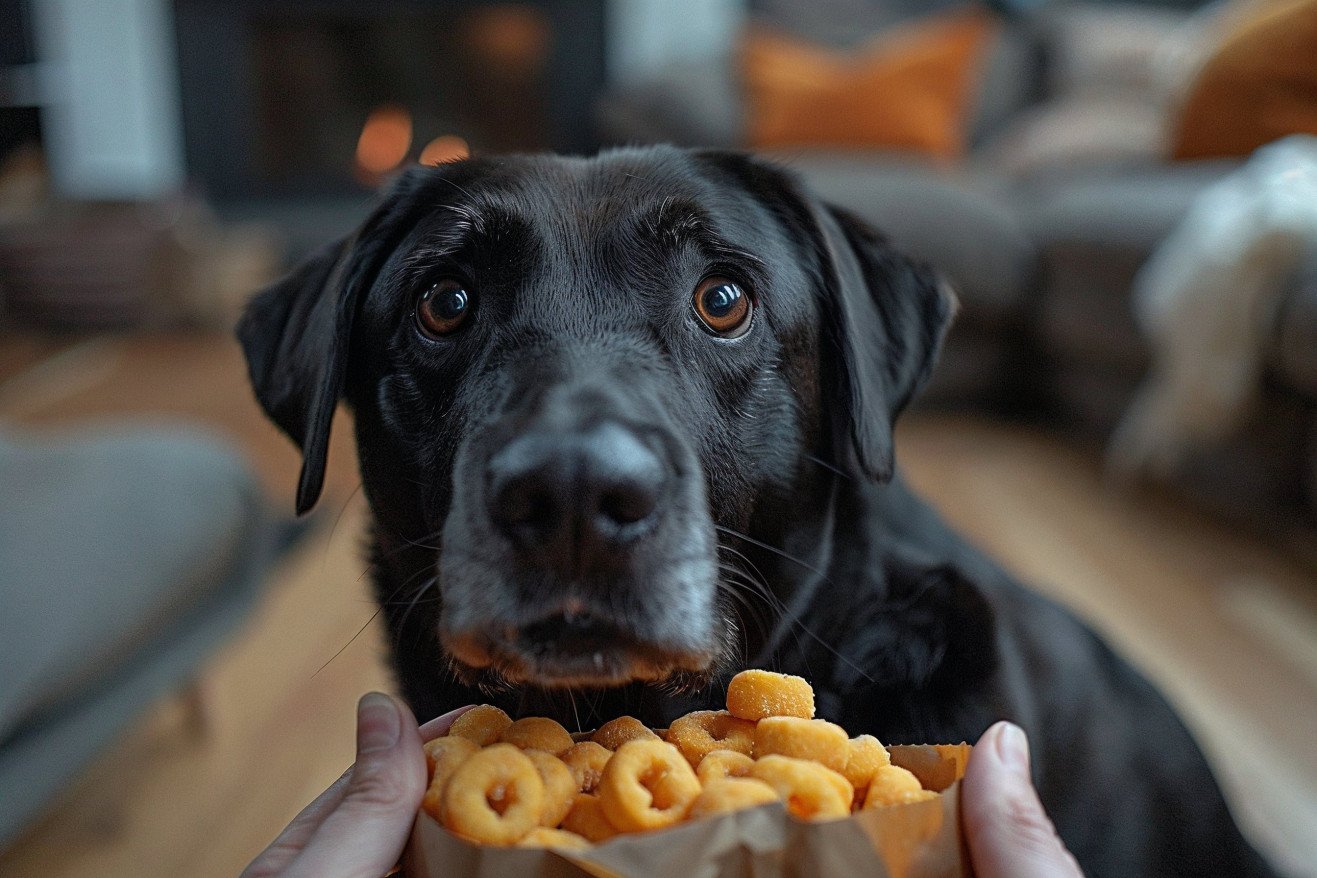Can Dogs Eat Funyuns? Breaking Down the Risks and Benefits
1 May 2024 • Updated 30 April 2024

Even though Funyuns might look like a delicious treat to share with your dog, it's important to know the risks and benefits before you give your furry friend this crispy snack. Dogs can have Funyuns in small amounts, but because of their high fat, salt, and artificial ingredient content, these onion-flavored rings should only be consumed occasionally as a special treat and never used as a replacement for a healthy, balanced diet.
To help you better understand whether or not dogs can eat Funyuns safely, we'll take a look at the scientific evidence related to dog nutrition and digestion. Through reviewing the opinions of vets and animal nutrition experts, you'll walk away with a well-rounded view of how Funyuns and other human junk foods may impact your dog's health.
Can dogs eat Funyuns?
Risks of Onion Toxicity in Dogs
Onions and garlic are part of the Allium species, which is made up of organosulfur compounds that are toxic to dogs. These organosulfur compounds, including N-propyl disulfide and thiosulfates, can cause oxidative damage to red blood cells and result in hemolytic anemia, a condition that can be fatal.
Signs of onion toxicity in dogs can include gastrointestinal problems, such as vomiting, diarrhea, abdominal pain, and loss of appetite. Dogs can also exhibit weakness, lethargy, pale gums, and discolored urine 1-7 days after consumption. According to Vetster, rapid breathing and loss of appetite are other signs to watch out for.
Early detection with physical examinations and blood work is important, as immediate medical intervention like decontamination and IV fluid therapy can help treat onion poisoning. That said, the best way to treat the condition is to prevent it - even small quantities of onions or onion-based snacks like Funyuns can build up in a dog's system, so it's best to avoid these foods altogether. By taking the right steps and learning about the risks, dog owners can help keep their pets safe from this severe hazard.
Healthy Alternatives to Funyuns for Dogs
Instead of Funyuns and other corn-based snacks, there are plenty of healthy alternatives that dogs can enjoy. For example, Healthy Snacks for Dogs: Safe Human Treats You Can Feed Your Pet at Petco lists apples, bananas, and berries as well as carrots, green beans, and sweet potatoes as safe snacks for dogs.
In addition, 11 Healthy, Natural Treats for Dogs in Your Kitchen at Raleigh Vet explains that plain, cooked proteins like chicken, turkey, and fish can be healthy treats for dogs in moderation. Other healthy options include whole grains, low-fat dairy like cottage cheese or plain yogurt, and natural nut butters, according to Top 14 Fresh Snacks for Dogs at The Farmer's Dog.
No matter what, it's important to control portions and to introduce new foods slowly while watching for any signs of allergies. However, by including these healthy, whole-food snacks in a dog's diet, pet owners can make sure they have healthy and safe alternatives to unhealthy snacks like Funyuns.
Can Dogs Eat Corn? The Risks and Benefits
Corn is safe for dogs to eat in moderation and is even a common ingredient in many commercial dog foods, according to the American Kennel Club. However, corn chips and other processed corn products like Funyuns are less healthy because of their high sodium content, unhealthy fats, and other additives, according to Therapy Pets Unlimited.
Although corn does offer some nutritional benefits, such as carbohydrates and essential fatty acids, it should not be a major component of a dog's diet, the American Kennel Club says. Dogs that are sensitive or allergic to corn can have negative reactions, so pet parents should watch for signs of intolerance.
The best way to feed corn to dogs is to do so in moderation and to make sure that the corn products you choose are minimally processed and of high quality, according to the American Kennel Club. This will help ensure that dogs get the potential benefits of corn while avoiding the unhealthy aspects of processed corn.
Corn-Based Dog Treats You Can Make at Home
If you want to feed your dog corn in a way that's a little healthier, homemade treats are a great way to go. Many recipes use ingredients like cornmeal, corn flour, peanut butter, and whole wheat flour, which can help ensure a more balanced nutritional profile, like in the case of the Sparky's Doggie Treats Recipe. Baked treats made with cornmeal and peanut butter are also popular and easy to make and are often enjoyed by many dogs, like the Peanut Butter Cornmeal Dog Biscuits from The Domestic Rebel.
There are also vegan and gluten-free recipes that use cornmeal and applesauce for dogs with dietary restrictions, like the one in Dog Treats Made from Corn from Vegetarian Underground. Making treats at home also lets you make sure you're using only the best ingredients and that you're controlling the portion size, so you can make sure your dog is getting a safe and nutritious snack.
Conclusion: Moderation and Healthy Choices for Dogs
Although Funyuns may be an appealing snack to share with your dog, it's important to weigh the potential risks and benefits before feeding this popular junk food to your furry friend. While Funyuns are safe for dogs to eat in moderation, their high fat, salt, and artificial ingredient content means that they should only be consumed occasionally and in small amounts as a treat, never as a substitute for a nutritious, well-balanced diet.
Onions and garlic are part of the Allium species, which contains organosulfur compounds that are toxic to dogs. These compounds can cause oxidative damage to red blood cells and result in hemolytic anemia, a condition that can be fatal. Signs of onion poisoning in dogs can include vomiting, diarrhea, weakness, lethargy, pale gums, and dark urine. Early detection and treatment are important for the management of onion toxicity in dogs.
While Funyuns and other corn-based snacks should be avoided, there are many healthier alternatives that are safe for dogs to eat. Some examples of healthy, dog-friendly snacks include fruits, vegetables, lean proteins, whole grains, and low-fat dairy. Petco, Raleigh Vet, and The Farmer's Dog all offer lists of healthier options.
While corn is safe for dogs to eat in moderation, corn-based products like chips and other snacks are often high in sodium, unhealthy fats, and artificial ingredients. The American Kennel Club and Therapy Pets Unlimited both discuss the safety of corn for dogs.
If you're interested in making corn-based treats for your dog, homemade snacks that are made with whole, minimally processed ingredients like cornmeal and applesauce are a good option, as demonstrated by recipes from Allrecipes, The Domestic Rebel, and Vegetarian Underground.
In the end, moderation, portion control, and the use of whole, minimally processed ingredients are the most important factors to consider when it comes to ensuring that dogs have a healthy, balanced diet.


